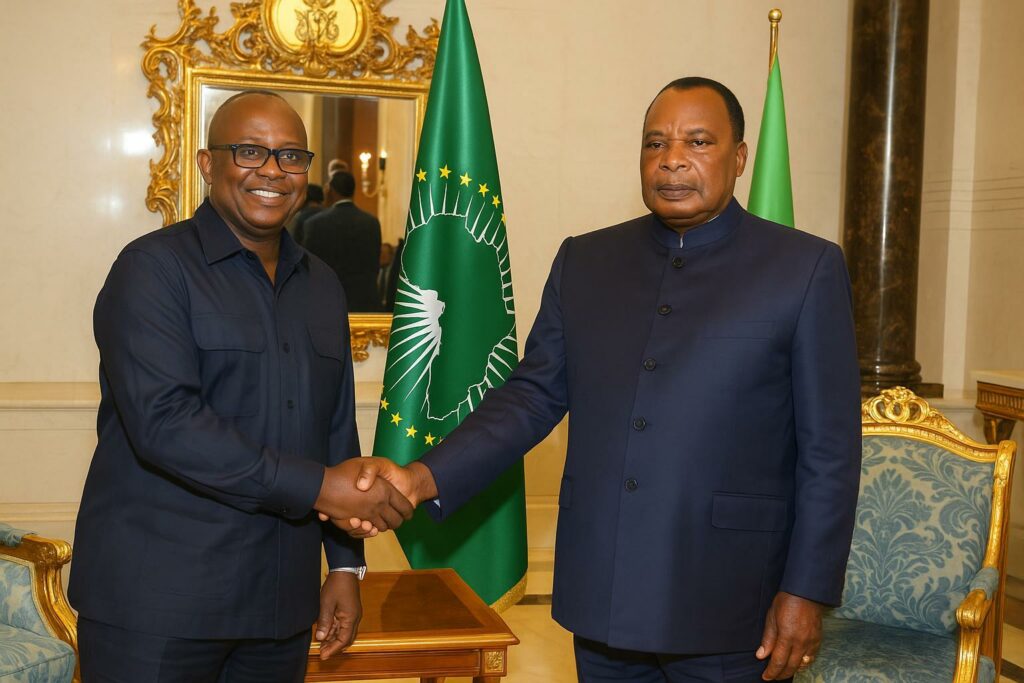Presidential Dialogue Signals Fresh Momentum
The red-carpet welcome reserved for President Umaro Sissoco Embaló on 15 October in Brazzaville set a cordial tone for the second face-to-face meeting between the Bissau-Guinean leader and his Congolese counterpart in less than two years. According to the communiqué issued by the office of President Denis Sassou Nguesso the two leaders met for nearly three hours, alternating a restricted tête-à-tête with an extended session that gathered key ministers and senior diplomats (Congolese Presidency, 15 Oct. 2023).
Officials on both sides underline that the objective was not to draft a grandiose new treaty overnight but to create a pragmatic architecture capable of translating political will into deliverables. The decision to establish ad hoc working groups—each co-chaired by line ministers and mandated to report within six months—illustrates this hands-on approach. President Embaló, himself a former army general known for his transactional diplomacy, praised what he called “Brazzaville’s culture of consensus” before boarding his return flight, insiders report (ANG, 16 Oct. 2023).
From Visa Waivers to Sectoral Task Forces
The starting point of the new roadmap is the bilateral agreement of 11 January 2022, signed in Bissau, which abolished visas for holders of diplomatic and service passports. That accord, coupled with a memorandum on political consultations, created channels that the two governments now want to widen for business travelers, researchers and technical experts. Congolese Foreign Minister Jean-Claude Gakosso confirmed that an impact assessment on extending visa facilitation to ordinary passports is under way, pending security vetting and civil-aviation studies.
Task forces will mirror the thematic clusters already outlined in the 2022 framework: commerce, economy, mining, petroleum, industry, agriculture and services. Each cluster will inventory regulatory overlaps, fiscal incentives and potential public-private partnerships. While the model may appear bureaucratic, it avoids the bureaucratic drift that has plagued many South-South agreements on the continent by tying progress to explicit performance indicators.
Energy and Mining: Harnessing Complementary Assets
Congo-Brazzaville, sub-Saharan Africa’s third-largest oil producer, offers mature petroleum legislation and an expanding network of service providers. Guinea-Bissau, by contrast, controls promising but under-explored offshore blocks in the MSGBC basin. Energy analysts consulted in Dakar suggest that shared geological surveys and training exchanges could lower exploration costs for Bissau while opening frontier acreage to experienced Congolese operators. The Brazzaville meeting further mooted the idea of a joint representation at the forthcoming MSGBC Basin Summit, where both states intend to pitch a ‘Two Coasts, One Basin’ narrative to international investors.
Mining complementarities are no less significant. Bauxite and phosphates in Guinea-Bissau could feed smelters and fertilizer plants in Congo’s Special Economic Zones, reducing transport distances compared with Asian suppliers. Conversely, Congo’s manganese and iron ore corridors may benefit from Bissau’s Atlantic ports as alternative gateways to North American markets.
Agriculture and Services: Diversifying Beyond Hydrocarbons
Both governments acknowledge that commodity cycles remain volatile. Diversification into agri-business and services therefore features prominently in the task-force agenda. Congo’s Ministry of Agriculture is preparing demonstration plots for Bissau-Guinean agronomists in the fertile Niari Valley, focusing on cassava processing and rice intensification. Guinea-Bissau plans to reciprocate by opening cashew and mango value-chain facilities to Congolese investors seeking export-grade horticulture expertise.
In the services sphere, officials are exploring co-branded tourism circuits linking the Bijagós Archipelago’s marine reserves to Congo’s Odzala-Kokoua National Park, targeting diaspora and eco-conscious travelers. Early conversations with regional carriers hint at charter packages that could materialise once direct air links are economically justified.
Legal and Economic Perspective
Jurists consulted at Marien Ngouabi University observe that the visa-waiver clause, though limited to official passports for now, already sets a precedent for mobility rights inside the Economic Community of Central African States—even though Guinea-Bissau is formally aligned with ECOWAS. Should ordinary-passport waivers follow, the two states will need harmonised customs codes and fit-for-purpose dispute-settlement mechanisms. Cognisant of that requirement, the task forces have been instructed to benchmark OHADA commercial law and African Continental Free Trade Area protocols to avoid incompatibilities.
Economists stress that tangible results will depend on financing. Brazzaville has signalled willingness to tap the African Export-Import Bank for project preparation, whereas Bissau is counting on syndicated loans backed by Lusophone development funds.
Regional Diplomacy and Multilateral Synergies
Beyond bilateralism, the rapprochement consolidates each leader’s standing in his respective sub-regional arena. President Sassou Nguesso, currently serving as one of the mediators in the Sahel crisis, reinforces Congo’s image as a bridge builder between the Gulf of Guinea and West Africa. President Embaló, chair of the ECOWAS Council of Elders, gains the symbolic endorsement of an ECCAS heavyweight. Analysts in Addis Ababa note that this cross-community axis may bolster Africa’s push for greater coherence in global climate and financial negotiations.
Key Takeaways for Stakeholders
Although still embryonic, the Brazzaville roadmap offers a calibrated blend of political symbolism and economic pragmatism. The institutionalisation of task forces gives private operators a predictable interlocutor in each sector. Visa facilitation, if broadened, could unlock human-capital exchanges that seldom figure in conventional trade statistics yet often prove decisive. Finally, by presenting a united front at forthcoming energy and climate forums, Congo and Guinea-Bissau may punch above their individual weight, demonstrating how medium-sized African states can leverage South-South diplomacy to mutual advantage.

